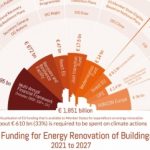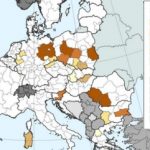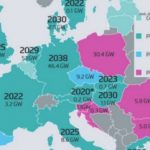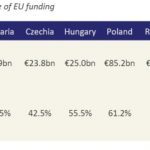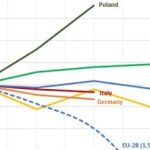The exclusion of Russia from Europe’s energy future opens a door for the U.S. to export its nuclear plants, explain Matt Bowen and Sagatom Saha at the Center on Global Energy Policy. That’s why, in April, the U.S. announced financing of up to $4bn to deploy U.S. small modular reactors (SMRs) in Poland. A successful deployment there could lead to the same in Romania, Slovakia, Estonia, the Czech Republic and Ukraine, all of which have coal plants … [Read more...]
Europe: preventing a “carbon wall” between the West and the ten Central and Eastern EU nations
Diana-Paula Gherasim at the IFRI Centre for Energy & Climate summarises her 36-page data-rich report on the progress and challenges for the ten Central and Eastern EU (CEECs) countries in decarbonisation. The Russian invasion of Ukraine has focussed all minds on energy security and the best solutions: less fossils, efficiency gains and clean energy made in the EU. Gherasim says that vitally important progress is being made in avoiding a … [Read more...]
How to tax renewable energy firms for windfall profits from high wholesale electricity prices
Should windfall taxes be imposed on renewable energy firms that have benefitted from the current high electricity prices caused by the increases in oil, gas and coal prices triggered by Russia’s invasion of Ukraine? If so, how, and how much? The IEA has conducted a study of the EU to try to uncover who has (and hasn’t) made extraordinary profits, and how much. Up front they say this is difficult to do as the majority of installed renewable … [Read more...]
Our Hydrogen future: 27 authors imagine the world in 2030-2050
Here’s something very different for our readers today, and an opportunity for you to register for our Webinar and Q&A on Wednesday Feb 16th at 09:00 CET (register here). It’s to mark the book launch of “Touching Hydrogen Future”, where 27 energy experts from around the world have written a chapter each. They are fictional accounts of what our world could like in the near future. The countries covered are the Netherlands (2029), Denmark … [Read more...]
Concern over auto job losses as Europe transitions to EVs
The state premier of Lower Saxony, home of Volkswagen, says he would not tolerate a large-scale reduction in staff at Germany’s largest carmaker. There is talk of axing 30,000 VW jobs nationwide, though messages have been mixed. Benjamin Wehrmann and Sören Amelang at Clean Energy Wire look at the latest news, then summarise the implications of the EV transition for the auto industry across Europe. Highlights include the observation that a Tesla … [Read more...]
Central and Eastern Europe’s buildings renovation plans fall far short of 55% emissions cuts
There are big decarbonisation gains to be had in a renovation wave in Central and Eastern Europe (CEE) precisely because their building stock is very energy-inefficient, explains Christophe Jost at CEE Bankwatch. But Bankwatch's report on eight national plans - Bulgaria, Czechia, Estonia, Hungary, Latvia, Poland, Romania and Slovakia – reveals weaknesses in scale, funding, strategy and policy. Many are planning to comply with only the former 40% … [Read more...]
EU Buildings Renovations: get ready for minimum energy performance standards (MEPS)
To meet Europe’s 2030 climate targets the buildings sector must cut its emissions by 60%. That means annual renovations need to jump by an order of magnitude; at the moment it’s crawling at 1% per year. Worse, standard renovations save very little energy, just 9% in homes and 16% in commercial buildings. It’s the deep renovations that cut energy by 60% or more, but that’s only happening to under 0.3% of the stock. Louise Sunderland at RAP … [Read more...]
Coal regions are ideally suited for utility-scale Wind, Solar and jobs
Over 15% of total greenhouse gas emissions in the EU come from coal-fired energy generation. 18 EU countries still use coal for electricity production. The argument goes that the phasing out of coal threatens the livelihoods of coal workers and their regional economy. But it should be the opposite, argue Elif Gündüzyeli and Jörg Mühlenhoff at CAN Europe. Coal regions are ideally suited for new gigawatt-scale wind and solar. They already have the … [Read more...]
Europe’s 55% emissions cut by 2030: proposed target means even faster coal exit
The EC is proposing a target emissions reduction of 55% by 2030 compared to 1990 levels, instead of the previously agreed 40% (which the EU is on course to surpass). The main tool for achieving it will be the EU Emissions Trading System (ETS). Prices for allowances will rise, making coal increasingly uncompetitive. Sören Amelang, Kerstine Appunn and Julian Wettengel at CLEW talked to a number of experts who say the new target implies a near total … [Read more...]
The EU can support Central and East Europe’s transition
Six Central and East European nations, heavily dependent on coal, have been very cautious about the pace of the EU’s transition. For them - Bulgaria, Czechia, Hungary, Poland, Romania and Slovakia - the political and economic disruption looks far harder to bear. E3G has just released a report that suggests this picture can change. The report’s authors – Felix Heilmann, Rebekka Popp and Ada Ámon – explain that coal is becoming less profitable, … [Read more...]
EU policing of Member State gas plans not consistent
Elisa Giannelli at E3G explains why the European Commission’s assessment of Member States’ natural gas plans is not consistent, on three fronts. Firstly, with its own EU climate targets: many nations are planning to increase their consumption of and investment in gas regardless of EU-wide targets to cut emissions. Secondly, the Commission is critical of some of these nations but actually supportive of others. Thirdly, even the EU’s own policies … [Read more...]
Small Modular Reactors: interview with NuScale’s Jose Reyes
Dan Yurman has interviewed the co-founder and Chief Technology Officer of NuScale Power, Jose Reyes. NuScale designs and markets small modular reactors (SMRs). Its NuScale Power Module can generate 60 MW: small units, alone or combined, can suit a far wider range of energy demand than standard reactors that deliver hundreds of MWs at a minimum. The comprehensive interview covers international and U.S. developments, including plans to commence … [Read more...]
Small nations have big plans for nuclear energy
Dan Yurman looks at how small nations are trying to increase their nuclear supply. Romania has the US and China both pitching for business. The Czech Republic is still vague about giving electricity price guarantees, something that caused the collapse of a $25bn nuclear tender in 2014. Ukraine looks at Small Modular Reactors. The author starts with the Baltics – net importers of electricity – and Estonia’s ambition to redress that balance using … [Read more...]








